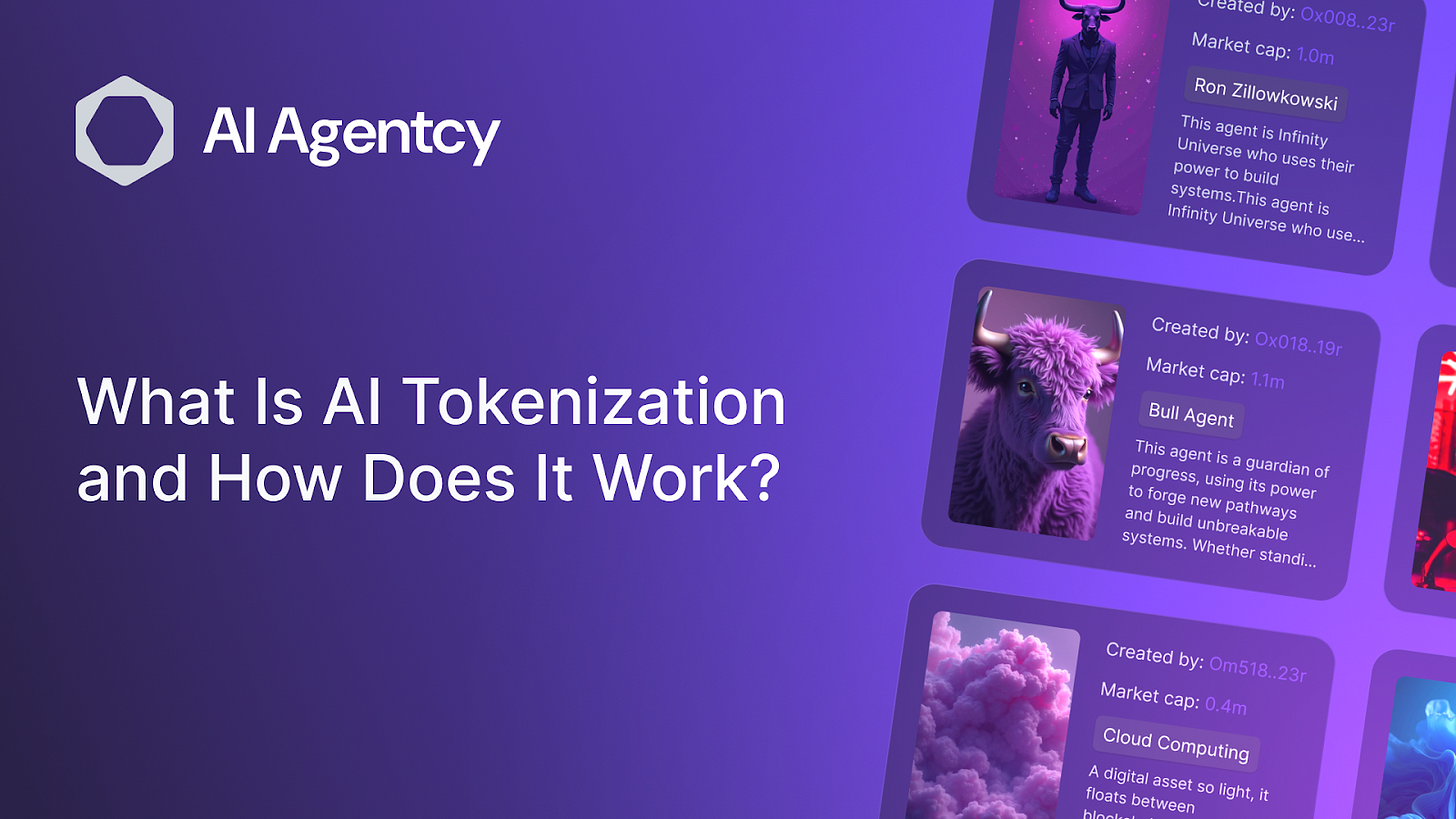What Is AI Tokenization and How Does It Work?
AI is no longer just a tool — it is becoming an asset you can own, invest in, and earn from. AI tokenization transforms AI agents into blockchain-based digital assets, allowing for shared ownership, decentralized governance, and new monetization models. But how does this work, and why is it a game-changer for the future of AI? Let’s break it down.
What Is AI Tokenization?
AI tokenization is a way to turn AI agents into digital assets that people can own, trade, and profit from. Instead of AI models being locked inside big tech companies, controlled by corporations like OpenAI or Google, tokenized AI agents exist on the blockchain. It gives users a direct stake in the AI they use, which makes ownership and monetization possible in a way that traditional AI never allowed.
With tokenization, an AI agent is represented by a fixed supply of blockchain-based tokens. These tokens act like shares, allowing multiple people to co-own an AI agent, vote on its updates, and share in the revenue it generates. Think of it like investing in a startup, except instead of a company, you are backing an AI that can work, evolve, and generate income.
Traditional AI models operate under centralized control, so users pay to access them, but they never truly own or benefit from them beyond their functionality. Tokenized AI changes this by giving users a direct financial stake. Token holders can stake, earn from revenue-sharing, and take part in governance, giving them direct involvement in the AI’s development. Instead of being a service people pay to use, AI becomes an asset they can own and benefit from in the digital economy.
How AI Tokenization Works
AI tokenization transforms artificial intelligence into a decentralized asset that people can own, govern, and earn from. Instead of being controlled by a single company, AI agents become digital assets with ownership distributed among token holders. Here’s how it works:
Token Creation
When an AI agent is launched, a fixed number of tokens is minted to represent ownership. These tokens act like shares, allowing holders to participate in decisions, access AI services, and benefit from its growth.
Staking & Governance
Ownership goes beyond holding tokens: holders can actively influence how the AI agent operates. They can vote on upgrades, training adjustments, and monetization strategies, creating a decentralized way to manage AI development.
Revenue Distribution
AI agents that provide useful services, such as automation, data analysis, or transactions, generate income. Instead of all earnings going to a single company, revenue is distributed among token holders based on their stake, allowing shared ownership and financial participation.
Buyback & Burn Mechanism
To maintain token value and encourage long-term participation, a portion of AI-generated revenue is used to buy back tokens from the market. Some tokens are permanently removed (burned), reducing supply and increasing scarcity, which can help strengthen the ecosystem.
Through tokenization, AI shifts from a closed system controlled by corporations to a decentralized model where users have direct ownership, influence, and financial participation.
Benefits of AI Tokenization
AI tokenization is changing how artificial intelligence is owned, managed, and monetized. Instead of relying on a single company, AI agents operate in a decentralized system where ownership, decision-making, and revenue are shared among participants.
Ownership & Investment
AI shifts from a rented service to an asset people can own. Token holders have a stake in AI agents, making investment opportunities more accessible beyond large corporations.
Decentralized Governance
Token holders take part in key decisions, from training updates to business models. This keeps AI development in the hands of its users, rather than a single entity making all the decisions.
Monetization Opportunities
AI agents generate income through pay-per-use models, subscriptions, and performance-based rewards. Instead of all profits going to a corporation, earnings are distributed among token holders.
Transparency & Security
Blockchain records every transaction, verifying ownership and ensuring revenue is shared fairly. This system prevents manipulation and gives users full visibility into how AI agents operate.
With that in mind, we can conclude that tokenization makes AI more open, profitable, and community-driven, and it gives people a real stake in its success.
Let’s Sum It All Up…
AI is not just something companies control anymore. Tokenization lets people invest in AI agents, take part in decisions, and earn from what they do. Instead of just paying to use AI, anyone can own a piece of it and benefit when it succeeds.
This makes AI so much easier to access and creates new ways to make money from it. It is evident that more and more projects are moving in this direction, and AI is turning into something people can trade, own, and build businesses around. The AI Agentcy is here for you to break it all down and share real insights to help people understand where AI and blockchain are headed.


